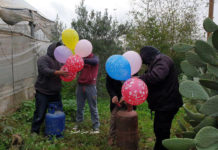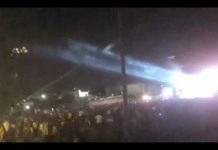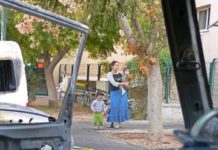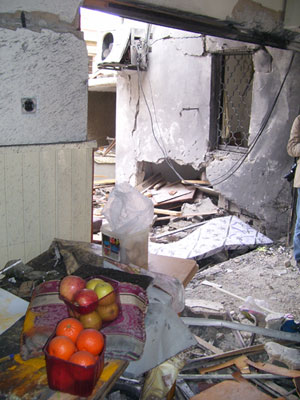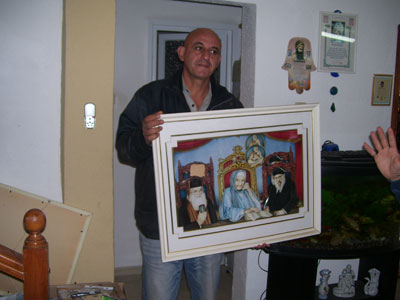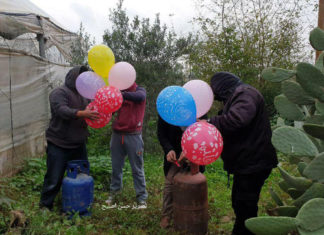Albert Avisrur looks at me in shock. He is a big man, about six foot, but the look in his eyes is that of a child whose world has been shattered.
Albert’s home was partially destroyed when a Palestinian rocket exploded in his neighborhood on Sunday, January 4th causing heavy damage to four other homes neighboring his own.
Albert stands overlooking the debris and rubble, what is left of his ‘safe room.’
“I moved to this neighborhood 27 years ago,” says Albert. “This is the first time that a Palestinian rocket has struck my home.”
The Avisrurs have no bomb shelter so the family sleeps in what is considered the safest room in the house, a room located opposite of the rocket fire coming from Gaza on the first floor. However, on Sunday morning around 8:30 am, the ceiling and wall of the Avisrurs’ s safe room collapsed.
The force of the Qassam explosion on the neighboring home blasted Albert and his son, 13, into the wall. “I saw my son lying on the floor under the rubble and debris,” says Albert. “I was terrified that the boy was hurt.”
Photo:Anav Silverman
Miraculously, both father and son suffered no physical injuries. Magen David Adom ambulances immediately arrived on scene, transporting Albert and his son to Ashkelon’s Barzilai Medical Center, located 20 minutes away.
Albert shows me a photo of three revered Moroccan rabbis including the Baba Sali, which had been hung up in the safe room. He explains that the picture was one of few objects in the room that was not damaged in the rocket attack.
“It was a miracle,” repeats Albert over and over. “We could have been killed.”
Albert’s son is now in Haifa, living at his sister’s home until the rocket fire dies down. The Avisrurs’ have three other daughters, all married, with one daughterr living in Vancouver, Canada.
“I was born in Sderot and have lived here all my life,” says Albert. “I was married here, raised my family here, and built this house with my own hands 27 years ago.”
Albert heads upstairs, directing the Arab construction workers who have arrived to repair the damages done to his home. The top floor of the Avisrurs’s home suffered heavy damage as well, with shrapnel damaging two bedrooms. “Representatives from the Israel Tax Authority arrived immediately after to assess the damages,” says Albert. “They’ve been very responsive.”
But Albert is feeling far from calm. “I keep thinking about what happened, day after day,” he says. “I can’t sleep at night as I’m constantly reliving that moment– I’m still in shock.”
To top it off, the Sderot factory where Albert worked as a mechanical engineer has recently laid him off. He is currently out of work and barely managing to keep on his feet.
Photo:Anav Silverman
“Things can only get better now,” jokes Albert. But he doesn’t look hopeful.
Indeed, Albert’s damaged home and current economic situation is reflective of many Sderot residents.
Tzafania Gad, a Sderot resident of 12 years, who works at the Hollandia International, a leading international mattress factory located in the Sderot industrial zone, told Sderot Media Center that about 50% of workers at the company’s plant have not been able to make it to work in the past couple weeks. “Most of the workers live in the western Negev region with families and children,” says Tzafania. “Due to the continuous Palestinian rocket attacks, many stay at home. Those of us who do, are working less hours.”
“Production levels decrease dramatically when working under the terror of rocket fire,” says Tzafania.” The size of my paycheck has gone down this month. That affects everything-the household expenses, food bill, paying for heat and electricity.”
A year ago, in January 2008, a Palestinian rocket struck just outside the Hollandia mattress factory, which had Hollandia president and CEO, Avi Bassert resolved to move the company and its 100 employees to central Israel. The plan to move did not transpire, and since then the plant has been fortified with heavier protection from rocket attacks.
Since 2001, Gaza rocket fire has forced a number of Sderot factories to close. Factories in the Sderot area, originally numbering 80 in 2001 have dropped down to 69.
“The IDF operation in Gaza will hopefully end the eight years of Palestinian rocket terror against us,” says Tzafania, “so that Israelis living in Sderot and southern Israel can back to living normally again.”
Photos: Anav Silverman, Sderot Media Center
1) Avisrur’s neighbor’s home partially destroyed in the rocket attack.
2) Albert Avisrur holding photo of rabbis that was not damaged in the rocket attack.



